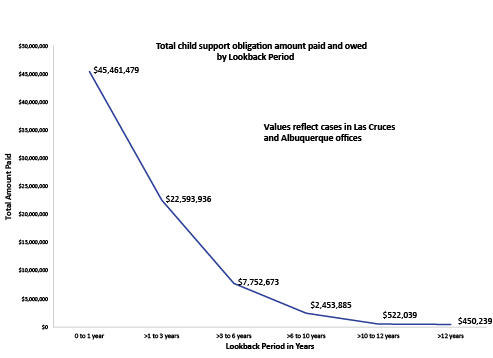02/10/2021
SANTA FE – Senator Gay Kernan and Representative Daymon Ely announced the introduction of legislation that modernizes New Mexico child support law and brings it in compliance with federal law that will collect more child support for New Mexico kids. Additionally, New Mexico will lose $147.5 million in federal funding: $122.6 million for the Temporary Assistance for Low-Income Families (TANF) program and $24.9 million in child support administrative/program funding if it fails to comply with federal law.
“The Human Services Department is grateful to Sen. Kernan and Rep. Ely for sponsoring this legislation to bring our child support law into compliance with federal law,” said Human Services Sec. David Scrase, M.D. “The impacts of COVID-19 disproportionately affect the poor and vulnerable. New Mexico families cannot afford to lose TANF funding, the primary cash assistance program for families with the lowest incomes nor can we afford to lose our federal match to administer the program that helps collect child support.”
Senate Bill 140 sponsored by Sen. Gay Kernan and the duplicate House Bill 190 sponsored by Rep. Daymon Ely comprehensively modernize several child support provisions to align with federal regulations and national best practices.
“This bill is long overdue, and we must bring New Mexico into federal compliance or sacrifice $147.5 million in federal funding for TANF and child support,” said Sen. Gay Kernan. “Moreover, job training and addressing the barriers to unemployment issues for low-income parents are the best ways to increase child support payments and bring more money to New Mexico’s children.”
The legislation revises several items which are required for federal compliance such as changing how child support is calculated. It updates the child support guideline table and the guideline statute to align with federal rules that are based on the combined parents’ actual income and the non-custodial parents’ ability to pay to calculate the monthly child support amount. It also allows the state to focus on providing employment opportunities and job security to help non-custodial parents meet their obligations.
“We want non-custodial parents to be involved in their children’s lives, and we want them to be able to support their children through gainful employment,” said Rep. Daymon Ely. “This legislation removes more punitive barriers that prevent non-custodial parents from supporting their children.”
The legislation adjusts the timeframe guidelines for assessing fees, costs, and expenses, along with assessing retro-active child support arrears, reducing it from 12-years to three-years. The court may assess for a longer period if there is a substantial showing that an action to establish paternity could not have been brought before the court any sooner.
National best practice for child support arrears is three-years. New Mexico statistical data on child support arrears shows: the state collects more child support money for children when the debt arrearage time-period is shorter.
“This bill is about getting additional money for New Mexico kids,” said Human Services Deputy Sec. Kari Armijo. “The more years we look back at trying to collect from non-custodial parents who owe backpay in child support, the less likely we are to collect anything at all.”
Studies show that when non-custodial parents owe less child support debt, they have significantly more contact with their children, are more likely to interact with them, and are more effective parents. Higher debt leads to decreased mental and physical health and worsens family relationships.
“Unrealistic child support orders don’t help anyone. Our data clearly demonstrates: the more a parent owes the less likely they are to pay,” said Child Support Director, Jeremy Toulouse. “This legislation helps the child support program continue its efforts to modernize, which ultimately benefits New Mexico’s children.”
The legislation includes that the healthcare needs of minor child is a basis for a modification of a child support order. It updates terminology, such as changing “health insurance” to “health care coverage” and “insurers” to “carriers”; and defines what a reasonable cost for medical care coverage is when determining if it should be ordered.
Additionally, the legislation clarifies the role and duties of the quadrennial Child Support Guidelines Review Commission to ensure that the application of the guidelines results in the determination of appropriate support amounts. It also defines their compensation, and term.
The table below reflects the collections data from child support cases in two of the largest child support offices in New Mexico, which shows higher child support collections are made when the retro-arrears is a shorter period of time.


